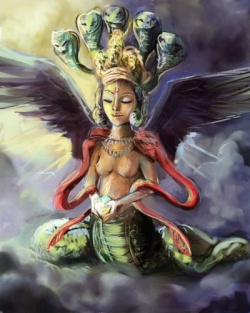Difference between revisions of "We are all Rinpoches: Nirmanakāyas and Dzogchen"
(Created page with "{{DisplayImages|2653|2392|2071}} by Malcolm Smith The purpose of this post is to settle a controversy [and perhaps create another] and remove a misunderstanding about so call...") |
|||
| Line 1: | Line 1: | ||
| − | {{DisplayImages|2653|2392 | + | {{DisplayImages|2653|2392}} |
by Malcolm Smith | by Malcolm Smith | ||
| − | The purpose of this post is to settle a controversy [and perhaps create another] and remove a misunderstanding about so called "sprul skus" or reincarnations, that venerable institution that causes so much controversy in Tibetan Buddhism. | + | The purpose of this post is to settle a controversy [and perhaps create another] and remove a misunderstanding about so called "sprul skus" or [[reincarnations]], that [[venerable]] institution that [[causes]] so much controversy in [[Tibetan Buddhism]]. |
| − | In the teaching of the great perfection there are two kinds of so called nirmanakāyas or tulkus. First, there are impure forward-progression [ma dag pa lugs 'byung] nirmanakāyas i.e. all sentient beings. These arise because of ignorance. | + | In the [[teaching]] of the [[great perfection]] there are two kinds of so called nirmanakāyas or [[tulkus]]. First, there are impure forward-progression [ma dag pa [[lugs]] 'byung] nirmanakāyas i.e. all [[sentient beings]]. These arise because of [[ignorance]]. |
| − | The second are pure reverse-progression [dag pa lugs ldog] nirmanakāyas: among these there are also two, those that come from the dharmakāya and sambhogakāya, nirmanākāyas of compassion if you will. The second are called nirmanakāyas of the attained result, these are sentient beings of pure karma, blessed by being seen by the buddhas, who make more and more progress, attaining higher and higher states of yogic understanding. | + | The second are [[pure]] reverse-progression [dag pa [[lugs]] ldog] nirmanakāyas: among these there are also two, those that come from the [[dharmakāya]] and [[sambhogakāya]], nirmanākāyas of [[compassion]] if you will. The second are called nirmanakāyas of the attained result, these are [[sentient beings]] of [[pure]] [[karma]], blessed by being seen by the [[buddhas]], who make more and more progress, [[attaining]] higher and higher states of [[yogic]] [[understanding]]. |
| − | Thus we sentient beings are all nirmanakāyas -- differentiated only by our level of relative attainment and relative level of pure and impure karma. | + | Thus we [[sentient beings]] are all nirmanakāyas -- differentiated only by our level of [[relative]] [[attainment]] and [[relative]] level of [[pure]] and impure [[karma]]. |
| − | The so-called "tulkus" of institutional Tibetan Buddhism are also sentient beings; some with higher yogic attainments, some with none, and others with some. Because they are sentient beings, some remember their rebirths well, and others not at all. Some achieve high levels of yogic understanding, some are great teachers, some are panditas, poets and artists. Some tulkus are mere politicians, some are gangsters, some are thieves. But they are all sentient beings. Not one of them was not born from the womb of a human mother. | + | The so-called "[[tulkus]]" of institutional [[Tibetan Buddhism]] are also [[sentient beings]]; some with higher [[yogic]] attainments, some with none, and others with some. Because they are [[sentient beings]], some remember their [[rebirths]] well, and others not at all. Some achieve high levels of [[yogic]] [[understanding]], some are great [[teachers]], some are [[panditas]], poets and {{Wiki|artists}}. Some [[tulkus]] are mere politicians, some are gangsters, some are thieves. But they are all [[sentient beings]]. Not one of them was not born from the [[womb]] of a [[human]] mother. |
| − | Most tulkus are never "recognized" because anyone who practices Dharma sincerely is a tulku, no matter what level of "realization" they are reputed to have, whether or not they have been recognized. In this sense, a tulku is defined as someone who acts to help sentient beings inspired by the compassion of the buddhas for sentient beings. | + | Most [[tulkus]] are never "[[recognized]]" because anyone who practices [[Dharma]] sincerely is a [[tulku]], no {{Wiki|matter}} what level of "[[realization]]" they are reputed to have, whether or not they have been [[recognized]]. In this [[sense]], a [[tulku]] is defined as someone who acts to help [[sentient beings]] inspired by the [[compassion]] of the [[buddhas]] for [[sentient beings]]. |
| − | We are all rinpoches, precious ones. Sentient beings are precious because their plight is the cause of the compassion of the buddhas. Buddhas are precious because they exist solely to aid sentient beings from suffering. I guess you could say it is rinpoches all the way down. | + | We are all [[rinpoches]], [[precious]] ones. [[Sentient beings]] are [[precious]] because their plight is the [[cause]] of the [[compassion]] of the [[buddhas]]. [[Buddhas]] are [[precious]] because they [[exist]] solely to aid [[sentient beings]] from [[suffering]]. I guess you could say it is [[rinpoches]] all the way down. |
| − | Some people crave recognition, wanting others to acknowledge their status -- consider yourselves acknowledged but don't expect a title. If you want people to consider you a tulku, act like one. If you must, fake it. Faking it may even lead to developing some real compassion which exceeds your petty narrow-minded grasping to titles and position. Being a pure reverse-progression tulku means cherishing all sentient beings. Nothing is holding you back but your own selfishness. | + | Some [[people]] [[crave]] [[recognition]], wanting others to [[acknowledge]] their {{Wiki|status}} -- consider yourselves [[acknowledged]] but don't expect a title. If you want [[people]] to consider you a [[tulku]], act like one. If you must, fake it. Faking it may even lead to developing some real [[compassion]] which exceeds your petty narrow-minded [[grasping]] to titles and position. Being a [[pure]] reverse-progression [[tulku]] means cherishing all [[sentient beings]]. Nothing is holding you back but your own [[selfishness]]. |
| − | The Dzogchen teachings acknowledge that all sentient beings are tulkus. But whether that is meaningful is not up to the buddhas, it is up to each one of us and our dedication to the path of awakening and benefitting our fellow tulkus. | + | The [[Dzogchen]] teachings [[acknowledge]] that all [[sentient beings]] are [[tulkus]]. But whether that is meaningful is not up to the [[buddhas]], it is up to each one of us and our [[dedication]] to the [[path of awakening]] and benefitting our fellow [[tulkus]]. |
| − | In reality, tulkuhood is defined not by robes, titles, race, position, gender, education, or creed but by how we are able to apply wisdom and compassion in our efforts to aid sentient beings and alleviate their suffering. | + | In [[reality]], tulkuhood is defined not by [[robes]], titles, race, position, [[gender]], [[education]], or [[creed]] but by how we are able to apply [[wisdom]] and [[compassion]] in our efforts to aid [[sentient beings]] and alleviate their [[suffering]]. |
{{R}} | {{R}} | ||
[http://www.atikosha.org/ www.atikosha.org] | [http://www.atikosha.org/ www.atikosha.org] | ||
[[Category:Buddhism Related Articles]] | [[Category:Buddhism Related Articles]] | ||
Revision as of 01:19, 22 February 2014
by Malcolm Smith
The purpose of this post is to settle a controversy [and perhaps create another] and remove a misunderstanding about so called "sprul skus" or reincarnations, that venerable institution that causes so much controversy in Tibetan Buddhism.
In the teaching of the great perfection there are two kinds of so called nirmanakāyas or tulkus. First, there are impure forward-progression [ma dag pa lugs 'byung] nirmanakāyas i.e. all sentient beings. These arise because of ignorance.
The second are pure reverse-progression [dag pa lugs ldog] nirmanakāyas: among these there are also two, those that come from the dharmakāya and sambhogakāya, nirmanākāyas of compassion if you will. The second are called nirmanakāyas of the attained result, these are sentient beings of pure karma, blessed by being seen by the buddhas, who make more and more progress, attaining higher and higher states of yogic understanding.
Thus we sentient beings are all nirmanakāyas -- differentiated only by our level of relative attainment and relative level of pure and impure karma.
The so-called "tulkus" of institutional Tibetan Buddhism are also sentient beings; some with higher yogic attainments, some with none, and others with some. Because they are sentient beings, some remember their rebirths well, and others not at all. Some achieve high levels of yogic understanding, some are great teachers, some are panditas, poets and artists. Some tulkus are mere politicians, some are gangsters, some are thieves. But they are all sentient beings. Not one of them was not born from the womb of a human mother.
Most tulkus are never "recognized" because anyone who practices Dharma sincerely is a tulku, no matter what level of "realization" they are reputed to have, whether or not they have been recognized. In this sense, a tulku is defined as someone who acts to help sentient beings inspired by the compassion of the buddhas for sentient beings.
We are all rinpoches, precious ones. Sentient beings are precious because their plight is the cause of the compassion of the buddhas. Buddhas are precious because they exist solely to aid sentient beings from suffering. I guess you could say it is rinpoches all the way down.
Some people crave recognition, wanting others to acknowledge their status -- consider yourselves acknowledged but don't expect a title. If you want people to consider you a tulku, act like one. If you must, fake it. Faking it may even lead to developing some real compassion which exceeds your petty narrow-minded grasping to titles and position. Being a pure reverse-progression tulku means cherishing all sentient beings. Nothing is holding you back but your own selfishness.
The Dzogchen teachings acknowledge that all sentient beings are tulkus. But whether that is meaningful is not up to the buddhas, it is up to each one of us and our dedication to the path of awakening and benefitting our fellow tulkus.
In reality, tulkuhood is defined not by robes, titles, race, position, gender, education, or creed but by how we are able to apply wisdom and compassion in our efforts to aid sentient beings and alleviate their suffering.

